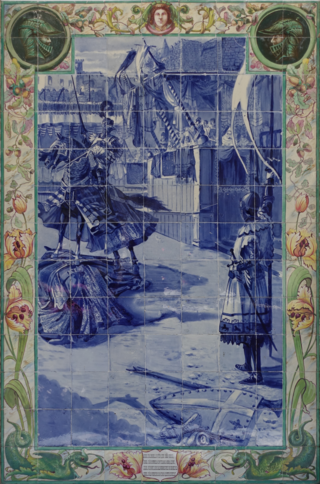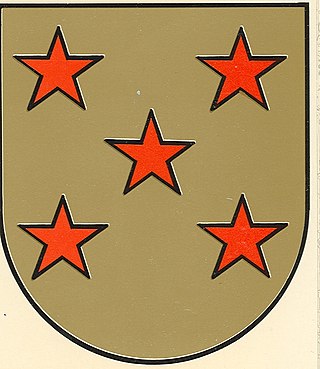Related Research Articles

Penedono is a municipality in the northern district of Viseu in Portugal. The population in 2011 was 2,952, in an area of 133.71 km2.
Constable of Portugal was an office created by King Ferdinand I of Portugal in 1382, to substitute the High Standard-bearer (Alferes-Mor) as the head of the Portuguese Military. It was also referred as the Constable of the Kingdom.

Count of Cantanhede was a Portuguese title of nobility created by a royal decree, dated from 6 August 1479, by King Afonso V of Portugal, and granted to D. Pedro de Menezes, 5th Lord of Cantanhede.

Álvaro Vaz de Almada, 1st Count of Avranches was an illustrious Portuguese knight and nobleman, with a long and illustrious career abroad in England. He was invested by the English king, Henry VI as the 1st Count of Avranches and made a Knight of the Garter.
Dom Fernando de Almada, 2nd Count of Avranches was a Portuguese nobleman.

The noble title of Marquis de Arronches was created on 27 April 1674 by D. Afonso VI of Portugal for Henrique de Sousa Tavares, 3º conde de Miranda do Corvo. The heir presumptive to the title is the only male descendant of the family, D. Pedro Miguel Vasques Milhinhos, who due to primogeniture will be the only one eligible to succeed D. Aires Manuel to the title.

The Count of Marialva was a Portuguese title of nobility created by a royal decree, issued in 1440, by King Afonso V of Portugal, and granted to Vasco Fernandes Coutinho, the third Marshal of Portugal.
Coutinho is a noble Portuguese language surname. It is a diminutive of Couto. It is from Late Latin cautum, from the past participle of cavere ‘to make safe.' It may refer to:
Vasco Fernades Coutinho was a distinguished Portuguese nobleman, the 3rd Marshal of Portugal and 1st Count of Marialva.
The high office of Admiral of the Kingdom of Portugal as the head of the Portuguese navy was created by King Denis of Portugal in 1317 for the Genoese nobleman and naval officer Manuel Pessanha. Although there is evidence that such a title existed before, it seems to have been of only a temporary character, for fleets assembled in times of war. The exception was perhaps Nuno Fernandes Cogominho who seems to have been appointed admiral by King Denis in 1307, and still had that title at his death in 1316, although the conditions are unclear. Nonetheless, Manuel Pessanha was the first person known to hold the title of Almirante-mor as a permanent office for a permanent fleet. All the king's galleys were under his jurisdiction. The conditions of the Pessanha's title stipulated that he must maintain a corps of at least 20 Genoese naval officers at all times and was obliged to serve the king in military service on land as well as sea.

Pedro de Menezes Portocarrero, was a 15th-century Portuguese nobleman and military figure. Pedro de Menezes was the 2nd Count of Viana do Alentejo, 1st Count of Vila Real and the first Portuguese governor of Ceuta.

Álvaro Pires de Castro was a powerful Galician-Portuguese nobleman, stem of the Portuguese branch of the House of Castro. He was the first Count of Viana, the first Count of Arraiolos and the first Constable of Portugal.

The Twelve of England is a Portuguese chivalric legend of 15th-century origin, famously related by the poet Luís de Camões in his 1572 Os Lusíadas. It tells the story of twelve Portuguese knights who travelled to England at the request of twelve English ladies to avenge their insult by a group of English knights.

The Forty Conspirators, were a Portuguese nationalist group during the Iberian Union. The Conspirators were composed of forty men of the Portuguese nobility, and many clergy and soldiers. Their goal was to depose the House of Habsburg king, Philip III.
The Captaincies of the Azores were the socio-political and administrative territorial divisions used to settle and govern the overseas lands of the Azores by the Kingdom of Portugal. These territories, a segment of the Captaincies of the Portuguese Empire, which usually conformed to the individual islands, allowing the stewardship of the King through the Donatary and Captaincy system.

Gonçalo Vasques Coutinho (1360s–1410s) was a Portuguese nobleman, 2nd Marshal of Portugal, who served as alcaide-mór of Trancoso and Lamego.

Gonçalo Coutinho was a Portuguese nobleman, Count of Marialva. and Constable of Portugal.

The Castle of Penedono is a medieval castle located in the civil parish of Penedono e Granja, in the municipality of Penedono, Portuguese district of Viseu.

The Castle of Lamego is a medieval castle located in the civil parish of Lamego, in the municipality of Lamego, Portuguese district of Viseu.

Dom Martinho de Ataíde, 2nd Count of Atouguia, was a 15th-century Portuguese nobleman and diplomat. In 1455, he was granted the lordship of the Canary Islands, by donation from King Henry IV of Castile, which he later sold to the Count of Viana.
References
- Magalhaes Sepulveda, C.A. de (1902) História orgânica e politica do exército portuguêz, Lisbon: Impresa Nacional